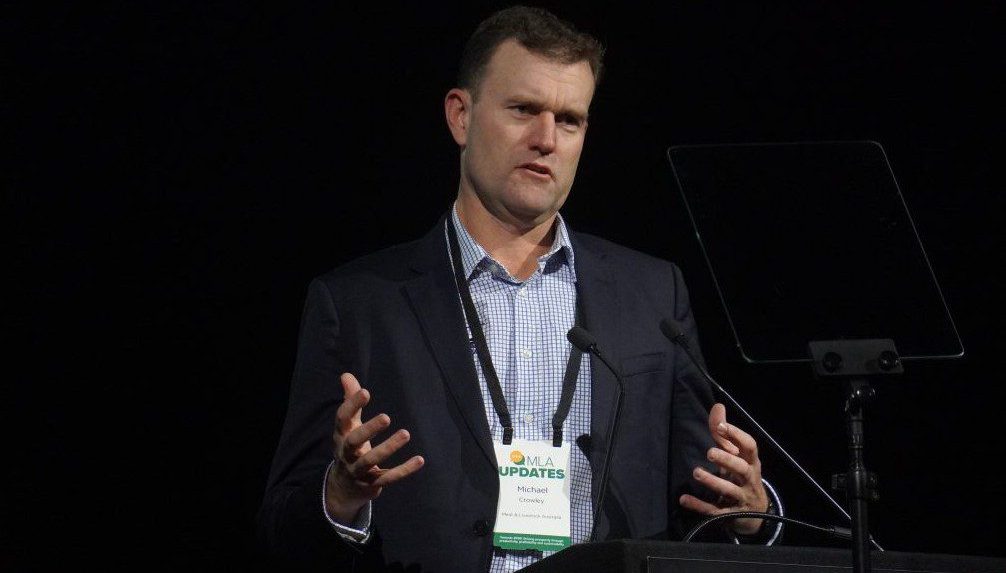
MLA managing director Mick Crowley speaks in Adelaide last week.
MEAT & Livestock Australia managing director Mick Crowley told last Thursday’s MLA annual general meeting that a greater emphasis on the ‘adoption part’ of the industry company’s research, development and adoption expenditure was paying big dividends.
He said the company invested $282 million last financial year across 16 R&D programs, the bulk of which were in the on-farm space.
Within MLA’s overall R, D & A effort, one of the big changes that had been made over the past five years had been a doubling of the industry’s investment emphasis in adoption of technologies, Mr Crowley said.
“Within our R&D investments in beef, sheep and goat meat productivity, when we think about how we drive that investment in research, we make sure we have a very clear pathway to adoption – it’s embedded in every project,” Mr Crowley said.
MLA’s Producer Adoption report released today suggests that Australian red meat producers are reaping the rewards of innovation, with its Adoption Program delivering and estimated $81.6 million in net annual benefits in 2024–25.
Australian red meat producers have realised substantial economic and productivity gains by adopting improved on-farm practices, the report shows. Since 2015, long-term modelling shows MLA’s Adoption Program has delivered a total of $1.34 billion in net benefits to producers.
These gains reflect measurable improvements in pasture utilisation, livestock performance, and business resilience, the report said.
Engaged producers report increased weight gains, higher weaning rates, improved feed budgeting, and reduced input costs. For example, participants in the Profitable Grazing Systems component of the program have improved grazing management and fertiliser strategies, while Nutrition Edge workshops have enabled tailored supplementation programs to boost herd productivity.
Widespread engagement and impact
Participation in the MLA Adoption Program remains strong, with 11,209 producers and 3047 advisors engaged in activities such as Profitable Grazing Systems, Producer Demonstration Sites, EDGE network, and BredWell FedWell, the report said.
The program has influenced more than 139 million hectares of agricultural land, driving practice change across cattle, sheep, and goat enterprises nationwide.
According to MLA’s program manager for adoption, Sally Leigo, these results show the real-world impact of the MLA Adoption Program.
“Producers aren’t just learning new techniques, they’re transforming their businesses. We’re seeing productivity lift through better grazing management, improved herd performance with tailored nutrition strategies, and greater resilience through informed, data-driven decisions,” she said.
“Every workshop, demonstration, and forum is an opportunity for producers to gain confidence, connect with peers, and put proven research into practice.
“The outcomes speak for themselves: measurable returns, healthier livestock, and more profitable, sustainable enterprises.”
Supporting sustainable growth
MLA’s approach combines peer-to-peer learning, supported coaching, and digital resources to ensure practice change is practical and sustainable.
By building advisor capability and connecting producers with proven research outcomes, MLA is helping the red meat industry achieve long-term profitability and sustainability.
To read the full 2024–25 Producer Adoption Outcomes Report, Click here.